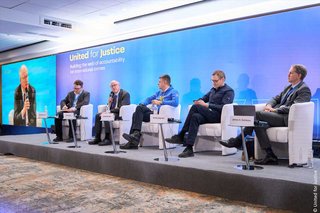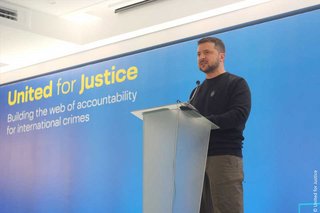Professor Dr Claus Kreß from the University of Cologne has voiced his support of a special international tribunal to prosecute crimes of aggression committed in the course of Russia’s war of aggression against Ukraine. Such a court should be established on the basis of a treaty between the United Nations and Ukraine, Kreß set out at the international conference “United for Justice” in Lviv. He also called for an expansion of the powers of the ICC. The ICC is currently not in a position to prosecute the crime of aggression if it arises out of a war of aggression by a state which, as is the case with the Russian Federation, is not a party to the ICC Statute. This would only be possible if the United Nations Security Council gave the ICC the green light to exercise its jurisdiction in such a situation.
Kreß firmly supported the ICC’s ongoing investigation with a view to possible war crimes, crimes against humanity and genocide, but he pointed out that these investigations do not cover the injustice in its entirety. As Professor Kreß explained in the course of the podium discussion: “The countless Ukrainian soldiers who lost their lives during the fighting form a part of the victims of the ongoing war. But as we all know, the killing of combatants in the course of the hostilities does not constitute a war crime. There is only one crime, the crime of aggression, which can cover this part of the injustice. Nobody can deny that these brave soldiers are victims of this aggression.”
A special international tribunal could act on the suspicion of crimes of aggression before long. This would require a request by the United Nations General Assembly to the United Nations Secretary General to conclude the necessary treaty with Ukraine.
But according to Kreß, a second and longer-term initiative is called for: The undue restriction currently contained in the ICC Statute must be honestly confronted because the ICC would be the ideal institution to prosecute the crime of aggression and also, above all, to contribute to its prevention. A two-track approach should therefore be pursued: Efforts should be made with a view to establishing a special international tribunal and in parallel, the longer and more burdensome path towards closing the gap in the ICC Statute should be pursued.
Kreß highlighted the important role of the Global South both for the establishment of a special tribunal and for the amendment of the ICC Statute: “It is crucial here to engage with the Global South. Of course, the Global South will have legitimate questions. One important question will be: Is it just about this horrible war of aggression or are you seriously and genuinely interested in strengthening the international legal architecture?”
The high-ranking conference “United for Justice – Building the web of accountability for international crimes” took place at the initiative of the Prosecutor General of Ukraine, Andriy Kostin, and was opened by the President of Ukraine, Volodymyr Zelenskyy, the President of Latvia, Egils Levits, the President of the European Commission, Ursula von der Leyen, and the Deputy Prime Minister and Foreign Minister of the Netherlands, Wopke Hoekstra. Numerous internationally renowned representatives from politics and justice participated in the three-day conference that aimed at establishing a global platform for the development of comprehensive accountability mechanisms for international crimes against the background of the Russian aggression against Ukraine. Among others, Didier Reynders, the European Commissioner for Justice, Karim Khan, the Prosecutor of the ICC, the United States Attorney General Merrick B. Garland and Laura Kövesi, the European Chief Prosecutor, were present and took place in the discussions.
Media Contact:
Professor Dr. Claus Kreß
University of Cologne
Institute for International Peace and Security Law
+49 221 470 5614
tanja.lieseuni-koeln.de
Press and Communications Team:
Robert Hahn
+49 221 470 2396
r.hahnverw.uni-koeln.de

